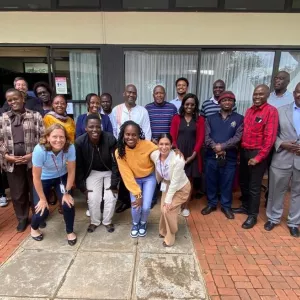IFPRI Kenya Strengthens Impact Evaluation Capacity Sharing with the University of Nairobi
From October 1st to 3rd, 2024, the International Food Policy Research Institute (IFPRI) Kenya office organized a transformative training on Impact Evaluation for teaching staff at the University of Nairobi. Led by Dr. Hailemariam Ayalew Tiruneh, Dr. Berber Kramer, and Dr. Naureen Karachiwalla, this initiative was a significant step in strengthening the capacity of local partners to conduct evidence-based research

IFPRI Kenya Strengthens Impact Evaluation Capacity Sharing with the University of Nairobi
From October 1st to 3rd, 2024, the International Food Policy Research Institute (IFPRI) Kenya office organized a transformative training on Impact Evaluation for teaching staff at the University of Nairobi. Led by Dr. Hailemariam Ayalew Tiruneh, Dr. Berber Kramer, and Dr. Naureen Karachiwalla, this initiative was a significant step in strengthening the capacity of local partners to conduct evidence-based research and foster accountability in development. This workshop is part of a continued collaboration between the University of Nairobi, IFPRI and the CGIAR Initiatives on National Polices and Strategies (NPS) .
The training brought together 36 participants from the Department of Economics and Development Studies and the Department of Agricultural Economics. Over the course of three days, participants were introduced to core concepts of Impact Evaluation methods, including causal inference, randomized controlled trials (RCTs), Instrumental Variables (IV), Difference-in-Differences (DiD), Regression Discontinuity Design (RDD), and Propensity Score Matching (PSM).
Beyond theoretical knowledge, the workshop emphasized practical skills, particularly in data analysis using STATA. This hands-on approach enabled participants to design, execute, and interpret impact evaluations effectively. By equipping lecturers with these tools, the training has paved the way for integrating impact evaluation into academic curricula, research projects, and policymaking processes.
The outcomes of the workshop have far-reaching implications. Participants not only enhanced their analytical skills but also developed a deeper appreciation for the role of evidence-based decision-making in driving effective and accountable development initiatives. One participant remarked on the usefulness of the training stating that, “I will now use these methods in my class.” This training aligns with IFPRI’s broader mission to promote sustainable and data-driven policy solutions through capacity building and collaboration.

As these university staff apply their new skills in their professional roles, the ripple effects of this initiative are expected to influence Kenya’s future policymakers and researchers, ensuring development strategies are grounded in rigorous evidence. The IFPRI Kenya office remains committed to empowering local institutions and fostering a culture of impact-driven change.
Authors:
Hailemariam Ayalew, Research Fellow, IFPRI
Faith Kimaiyo, Research Officer, IFPRI
Sam Gituro, Program and Administration Manager, IFPRI
Berber Kramer, Senior Research Fellow, IFPRI
Naureen Karachiwalla, Research Fellow, IFPRI
Clemens Breisinger, Senior Research Fellow/Program Leader- Kenya Strategy Support Program, IFPRI
This work is part of the CGIAR Research Initiative on National Policies and Strategies (NPS). CGIAR launched NPS with national and international partners to build policy coherence, respond to policy demands and crises, and integrate policy tools at national and subnational levels in countries in Africa, Asia, and Latin America. CGIAR centers participating in NPS are The Alliance of Bioversity International and the International Center for Tropical Agriculture (Alliance Bioversity-CIAT), International Food Policy Research Institute (IFPRI), International Livestock Research Institute (ILRI), International Water Management Institute (IWMI), International Potato Center (CIP), International Institute of Tropical Agriculture (IITA), and WorldFish. We would like to thank all funders who supported this research through their contributions to the CGIAR Trust Fund.

